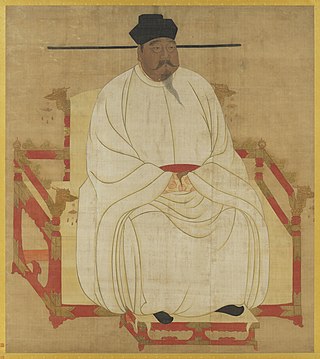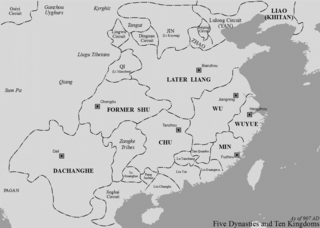
Year 812 (DCCCXII) was a leap year starting on Thursday of the Julian calendar.

The Five Dynasties and Ten Kingdoms period was an era of political upheaval and division from 907 to 979. Five dynastic states quickly succeeded one another in the Central Plain, and more than a dozen concurrent dynastic states, collectively known as the Ten Kingdoms, were established elsewhere, mainly in South China. It was a prolonged period of multiple political divisions in Chinese imperial history.

Emperor Taizu of Song, personal name Zhao Kuangyin, courtesy name Yuanlang, was the founder and first emperor of the Song dynasty of China. He reigned from 960 until his death in 976. Formerly a distinguished military general of the Later Zhou dynasty, Emperor Taizu came to power after staging a coup d'état and forcing Emperor Gong, the last Later Zhou ruler, to abdicate the throne in his favour.

Emperor Wuzong of Tang, né Li Chan, later changed to Li Yan just before his death, was an emperor of the Tang Dynasty of China, reigning from 840 to 846. Emperor Wuzong is mainly known in modern times for the religious persecution that occurred during his reign. However, he was also known for his successful reactions against incursions by remnants of the Uyghur Khanate and the rebellion by Liu Zhen, as well as his deep trust and support for chancellor Li Deyu.
Li Rong was a Chinese philosopher from the Tang dynasty. He compiled a commentary on the Taoist book Tao Te Ching, called the Laozi Commentary by Li Rong.
The Old History of the Five Dynasties was an official history mainly focus on Five Dynasties era (907–960), which controlled much of northern China. And it also includes some history of other south states during the era. It was compiled by the Song dynasty official-scholar Xue Juzheng in the first two decades of the Song dynasty, which was founded in 960. It is one of the Twenty-Four Histories recognized through Chinese history.
Li Wei or Wei Li may refer to:
Fang is the 47th most prevalent Chinese surname. In Chinese, Fāng (方) means "square" or "four-sided". Fāng (方) is pronounced Fong in Cantonese, Hong or Png or Pwee in some Min Nan dialects and Png or Pung in Teochew. It is the 56th name on the Hundred Family Surnames poem.
Li Dan or Lidan may refer to:

Lü is the pinyin and Wade–Giles romanisation of the Chinese surname written 吕 in simplified character and 呂 in traditional character. It is the 47th most common surname in China, shared by 5.6 million people, or 0.47% of the Chinese population as of 2002. It is especially common in Shandong and Henan provinces.
Li Rong (李溶), formally the Prince of An (安王), was an imperial prince of the Chinese Tang dynasty, being a son of Emperor Muzong.
Wang Rong, was a warlord in the final years of the Tang dynasty who later became the only ruler of the state of Zhao during the Five Dynasties and Ten Kingdoms period. Late in Tang, he initially tried to chart an independent course between the more powerful warlords Zhu Quanzhong and Li Keyong, but later was forced to become Zhu's vassal, although he continued to govern his domain without much interference from Zhu. After Zhu declared himself the emperor of a new dynasty of Later Liang, Wang continued to serve as a vassal and was created the Prince of Zhao. Later, though, when the Later Liang emperor tried to seize the Zhao domain by force, Wang broke away from Later Liang and realigned with Li Keyong's son and successor Li Cunxu the Prince of Jin instead. In 921, Wang was overthrown and killed in a coup led by his adoptive son Wang Deming, who subsequently took over his domain and changed back to the birth name of Zhang Wenli, before dying later in the year; Li Cunxu then defeated and killed Zhang's son and successor Zhang Chujin, incorporating Zhao into his Jin state.

Zhao was a state early in the Five Dynasties period of the history of China in what is now central Hebei. The ancestors of Zhao's only prince, Wang Rong, had long governed the region as military governors (Jiedushi) of the Tang dynasty's Chengde Circuit, and after the collapse of the Tang in 907, the succeeding Later Liang's founding emperor ("Taizu"), Zhu Wen made Wang, then his vassal, the Prince of Zhao. In 910, when the Emperor tried to directly take over the territory of Zhao and its neighboring Yiwu Circuit, Wang Rong and Yiwu's military governor Wang Chuzhi turned against the Later Liang, aligning themselves with Later Liang's archenemy, Jin's prince, Li Cunxu, instead. In 921, Wang Rong's soldiers assassinated him, slaughtered the Wang clan, and supported his adoptive son Zhang Wenli to succeed him instead. Li Cunxu soon defeated Zhang Wenli's son and successor Zhang Chujin and incorporated Zhao into Jin territory.

The Sichuanese, Sze Chuan or Ssu Ch'uan people (Chinese: 四川人; Sichuanese Pinyin: Si4cuan1ren2; Mandarin Chinese pinyin: Sìchuānrén; Wade–Giles: Szŭ4-ch'uan1-jen2, 川人 or 川渝人) are a Han Chinese subgroup comprising most of the population of China's Sichuan province and Chongqing municipality.

Wang Chuzhi (862–922), courtesy name Yunming, formally the Prince of Beiping, was a warlord late in the Chinese Tang Dynasty and early in the subsequent Five Dynasties and Ten Kingdoms period, who ruled Yiwu Circuit as its military governor (Jiedushi) from 900 and as its de jure sovereign from 910 to 921, when he was overthrown by his adoptive son Wang Du.

Taiwan 1895 is a Chinese television series based on historical events that took place in Taiwan in the late Qing dynasty, such as the 1884–1885 Sino–French War and the Treaty of Shimonoseki. The series was directed by Han Gang and written by Yang Xiaoxiong. It was first broadcast in mainland China on CCTV in 2008.

Lu is the pinyin and Wade–Giles romanization of the Chinese surname written 陆 in simplified character and 陸 in traditional character. It is also spelled Luk or Loke according to the Hong Kong Cantonese pronunciation. Lu 陆 is the 61st most common surname in China, shared by 4.2 million people. Most people with the surname live in southern China; 44% live in just two provinces: Jiangsu and Guangxi. Lu 陸 is listed 198th in the Song dynasty classic text Hundred Family Surnames.
The Chongxuan School was a Taoist philosophical current influenced by Buddhist Madhyamaka thought. It first appeared in the fifth century, and was influential from the eighth to tenth centuries during the Tang dynasty. It was not a structured philosophical school; it was identified and named by the Daodejing commentator Du Guangting. Chongxuan's most important representatives were Cheng Xuanying and Li Rong (李榮), both from the seventh century CE.









